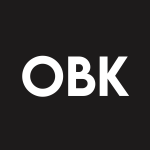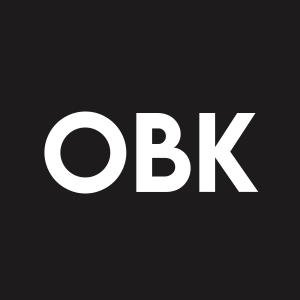Welcome to our dedicated page for Origin Bancorp SEC filings (Ticker: OBK), a comprehensive resource for investors and traders seeking official regulatory documents including 10-K annual reports, 10-Q quarterly earnings, 8-K material events, and insider trading forms.
This page provides access to U.S. Securities and Exchange Commission (SEC) filings for Origin Bancorp, Inc. (NYSE: OBK), a financial holding company headquartered in Ruston, Louisiana and the parent of Origin Bank. As a registrant under the Exchange Act, Origin Bancorp files current reports on Form 8-K and other periodic reports that document its financial condition, results of operations, governance changes, and significant events.
Origin’s Form 8-K filings frequently cover quarterly earnings announcements, including detailed information on net interest income, net interest margin, loan and deposit balances, credit quality metrics, and noninterest income and expense. These filings may also attach press releases and presentation materials used in investor conference calls and webcasts. Other 8-Ks disclose matters such as board decisions on quarterly cash dividends, stock repurchase authorizations, and certain corporate governance developments, including director resignations.
For a commercial banking organization like Origin Bancorp, SEC filings are a key source for understanding credit risk and capital management. Filings describe allowance for loan credit losses, nonperforming loans, classified loans, and provisions for credit losses, as well as the impact of specific credit relationships and events. They also provide context on initiatives such as Optimize Origin, which the company references in connection with productivity, balance sheet optimization, and culture and employee engagement.
On Stock Titan, Origin Bancorp’s filings are updated in near real time as they appear on EDGAR. AI-powered summaries highlight the main points of lengthy documents, helping users quickly grasp changes in earnings, credit quality, dividends, and capital actions without reading every page. Investors can also use this page to monitor ongoing disclosure related to credit events, dividend practices, and other regulatory communications filed by OBK.
Origin Bancorp, Inc. reported that it has issued a press release detailing its fourth quarter and full year 2025 operating results and prepared related investor presentation materials. The company will review these results on a conference call and webcast on January 29, 2026, at 8:00 a.m. Central Time.
The board of directors also declared a quarterly cash dividend of $0.15 per share on the company’s common stock, payable on February 27, 2026, to stockholders of record as of the close of business on February 13, 2026.
Origin Bancorp, Inc. announced that it will hold an investor conference call and webcast on January 29, 2026, at 8:00 a.m. Central Time to review its fourth quarter and full year 2025 financial results. The event will be accompanied by a slide presentation covering the company’s operations and financial performance. These presentation materials are expected to be posted on the company’s website after market close on January 28, 2026, giving investors additional context on business trends ahead of the call.
Origin Bancorp, Inc. Chairman, President and CEO Drake Mills, who also serves as a director, reported the vesting of 25,947 restricted stock units into common stock on December 13, 2025. These units converted into shares on a one-for-one basis at an exercise price of $0.
To satisfy income tax withholding on this vesting, 10,324 common shares were withheld by the issuer at $39.06 per share and do not represent a sale. Following these transactions, Mills beneficially owns 164,257 shares directly, 3,866 shares through an IRA, 57,837 shares through an issuer retirement plan, and 103,789 restricted stock units that remain outstanding.
Origin Bancorp (OBK) reported Q3 2025 results. Net income was
Noninterest income increased to
Origin Bancorp (OBK) disclosed an insider share purchase. A director bought 8,500 shares of common stock on 11/04/2025 at a price of $34.71 per share (transaction code P). After this trade, the director beneficially owns 12,709 shares, held as direct ownership.
Origin Bancorp, Inc. filed an automatic shelf registration statement on Form S-3 as a well‑known seasoned issuer. The filing permits the company to offer, from time to time after effectiveness, an indeterminate aggregate amount of securities, including common stock, preferred stock, debt securities, depositary shares, warrants, purchase contracts, purchase units, subscription rights and units.
Offerings may be conducted by the company and/or selling stockholders, in one or more tranches, using underwriters, dealers, agents or direct sales as described in a future prospectus supplement. The company’s common stock trades on the NYSE under “OBK.” Net proceeds and specific terms will be provided in the applicable prospectus supplement.
Origin Bancorp, Inc. (OBK) reported an insider share purchase by a director. On 10/29/2025, the director made two open‑market buys: 487 shares at $34.78 and 13 shares at $34.80, totaling 500 shares acquired.
Following these transactions, the director directly owns 160,618 shares. The filing was submitted for one reporting person and reflects direct ownership.
Origin Bancorp (OBK) disclosed an insider purchase. The company’s COO and Origin Bank President & CEO bought 1,500 shares of common stock on 10/29/2025 at $34.50 (transaction code P). After the trade, the reporting person beneficially owns 30,011 shares directly and 35,272 shares indirectly through an issuer retirement plan.
Origin Bancorp (OBK) reported insider buying by its Chief Financial Officer. The executive purchased 2,250 shares of common stock on 10/28/2025 at $34.80 and 2,250 shares on 10/29/2025 at $34.95, both coded “P” for open‑market purchases. Following these transactions, the officer beneficially owned 14,812 shares directly and 2,810 shares indirectly through the issuer’s retirement plan.
Origin Bancorp (OBK) insider activity: A director reported buying 1,000 shares of common stock on 10/27/2025 at $33.93 per share.
Following the purchase, the director directly owns 47,917 shares. In addition, 18,131 shares are held by Houston Trust Company; the director serves as Chairman and on its investment committee with shared voting and dispositive power and disclaims beneficial ownership except to the extent of any pecuniary interest.
The filing was made by one reporting person and reflects a routine Form 4 ownership update.


